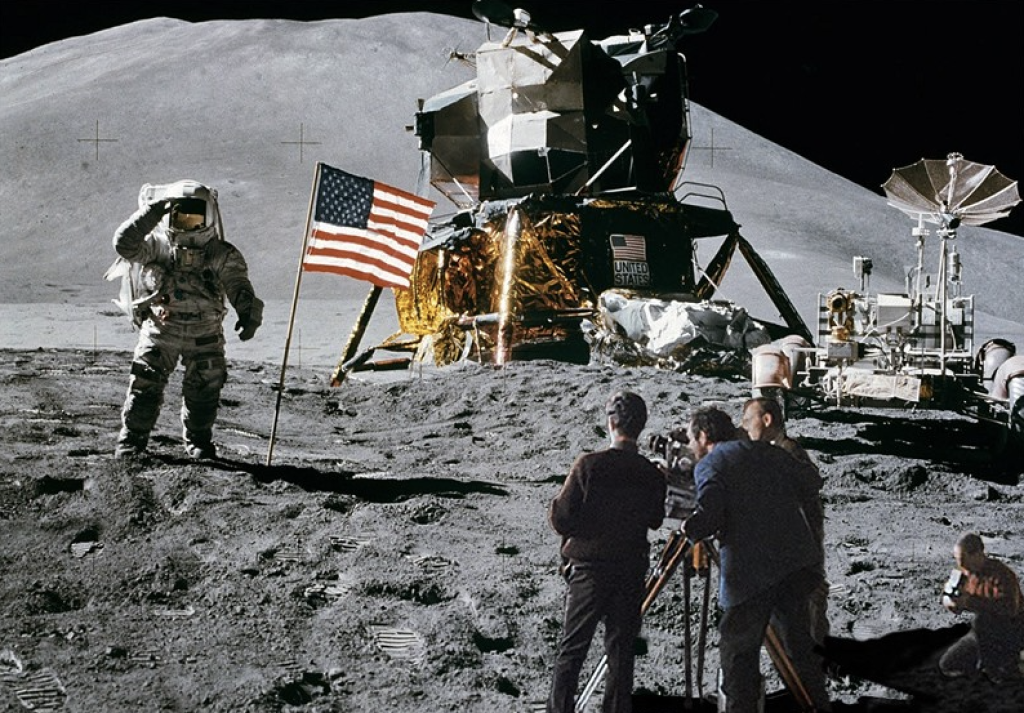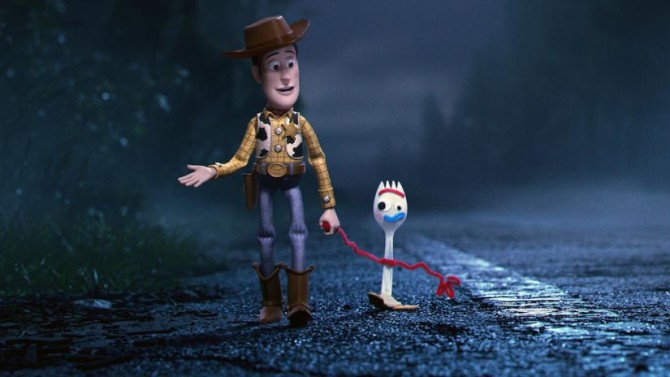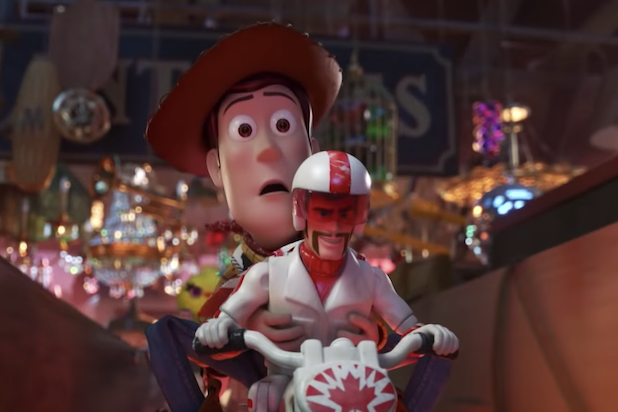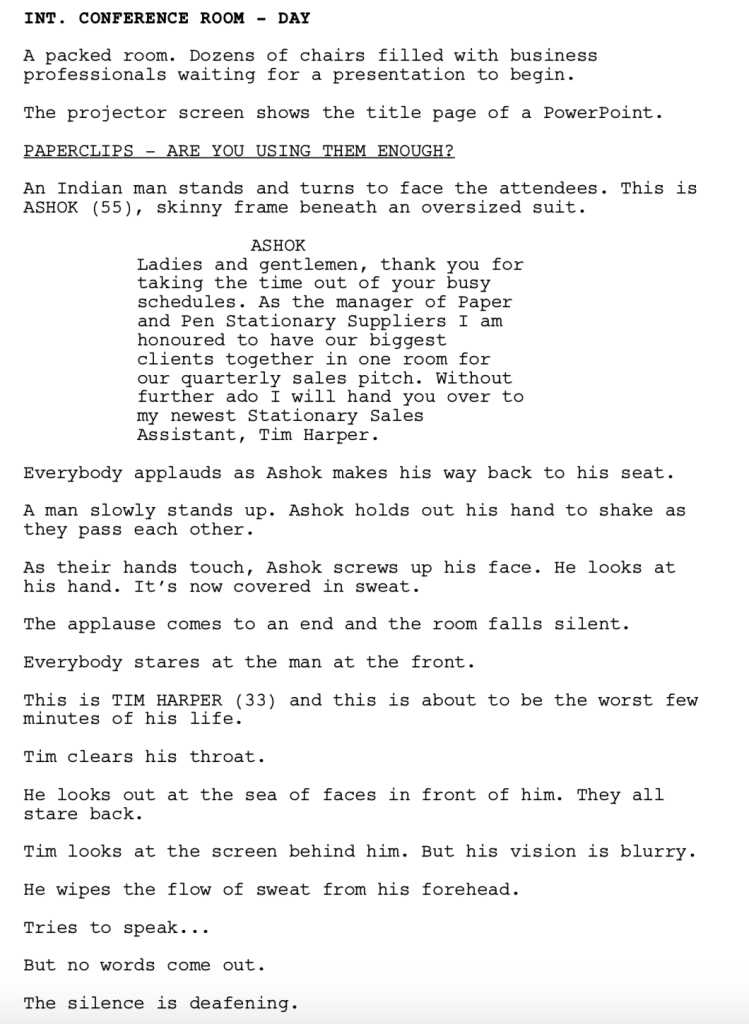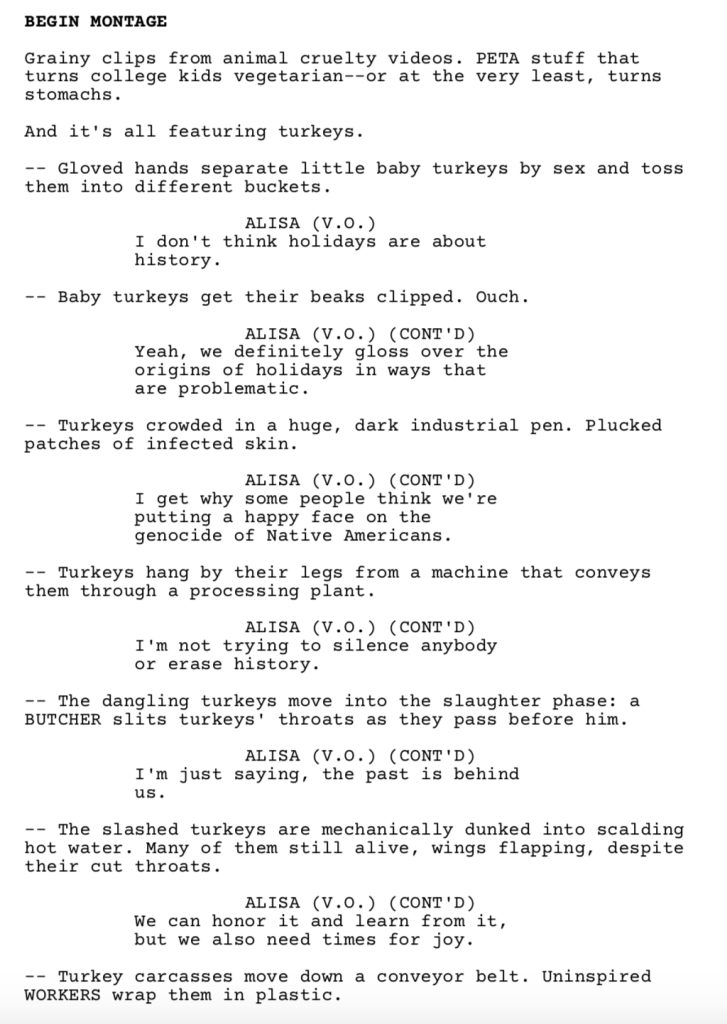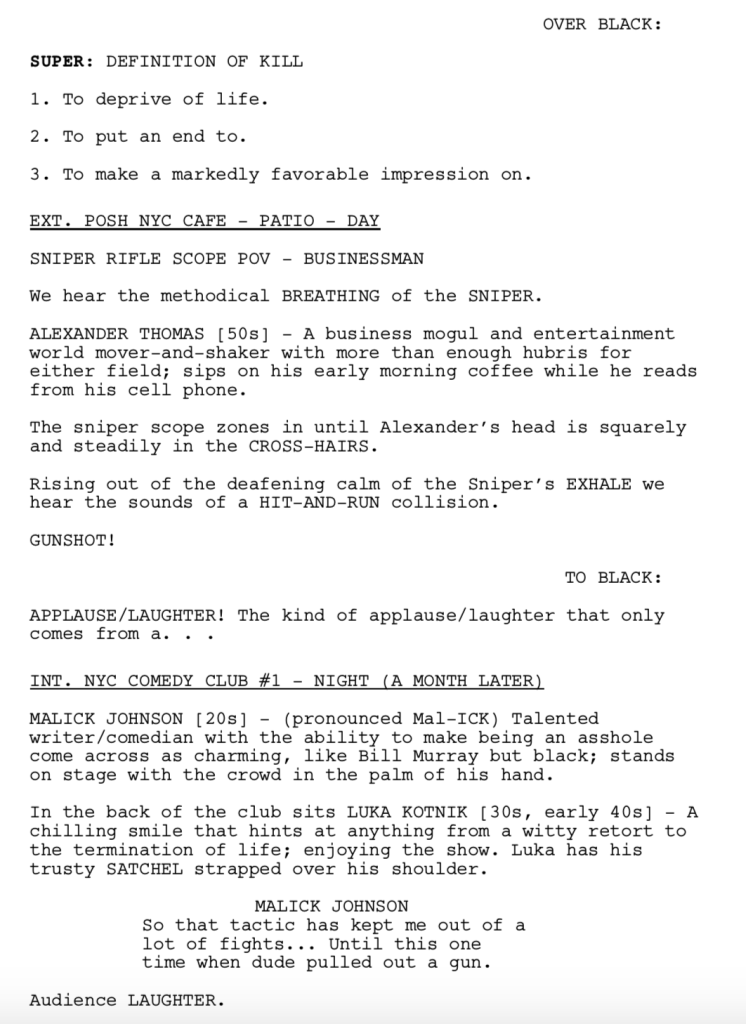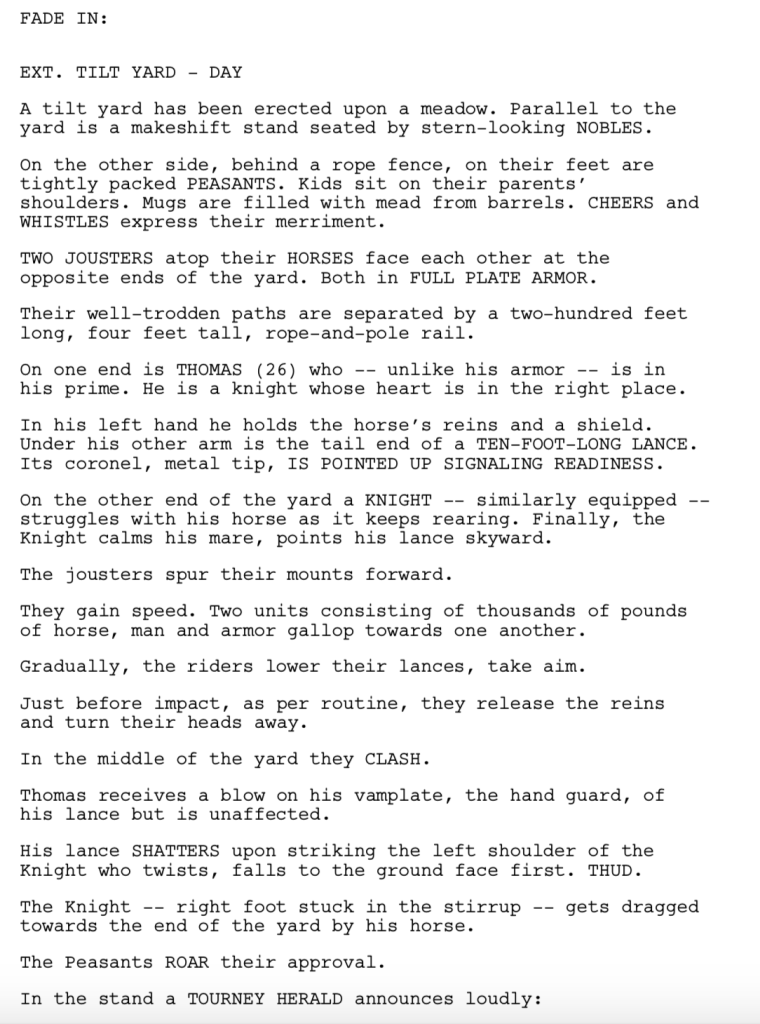Genre: Drama/Period/Conspiracy
Premise: A young upstart at NASA suggests that in order to beat the Soviets to the moon, the US have Stanley Kubrick fake the moon landing.
About: For those of you who caught yesterday’s post, Stephany Folsom is the co-writer of Toy Story 4. She got that job after writing this script, which made the 2013 Black List. Pixar is known for finding fresh writers who write darker/sophisticated material, presumably because they like themes that go further than skin deep. Folsom’s influences include Lou Reed, Steven Soderbergh, Kurt Vonnegut, Jean Renoir, and John Hughes.
Writer: Stephany Folsom
Details: 10/13 draft – 115 pages
One of the downsides of the Black List is that 70 scripts all get bunched up together with one big thumbs up and you don’t know which of them are actually good. The only way to find out is when they get written up on other sites and the only site that goes through them to find out is, well, this one. So until I read a Black List script myself, I never know what’s good. Apparently, this script was featured in several publications outside of the Black List and therefore was one of the few scripts getting legit endorsements (as opposed to making the list because an ambitious agent lobbied a bunch of development kids to vote for his client’s script). How I missed it? I don’t know. But, hey, better late than never.
It’s 1969 and two American spies in the Soviet Union have determined that rising leader Mikahil Suslov is less than a month away from launching a manned mission to the moon, three full months before the US will send their team. The American government believes that if the Soviets beat them to the moon, Suslov’s power will skyrocket and he will initiate an all-out nuclear attack on America.
A little known U.S. government NASA liaison named Barbara comes up with a solution for this: Fake the moon landing. Everyone ignores her until she gets an official government letter approving her request. Barbara believes there’s only one man for the job: eccentric director Stanley Kubrick. She practically barges into his home and makes her pitch. Kubrick declines until Barbara offers him an elusive government-made camera lens that can shoot in lower light than any other lens in the world. Kubrick is in.
The kooky Kubrick begins playing his games immediately, waiting until Barbara has driven him to the airport to tell her he doesn’t fly. She’s forced to drive him from New York to Florida. Once there, nobody at NASA seems to pay attention to Barbara and Stanley’s sideshow. I’m not sure why since I thought this was the key to saving the world. Kubrick busts out all the hits. He only communicates with Barbara via written notes. He shoots until the astronauts physically can’t move anymore. And after entire sets are built to his particularly stringent standards, he decides at the last second to tear them down and start over again.
At the last second, Kubrick decides to quit. Despite everything he shot being perfect, he never filmed the astronauts walking out of the module onto the moon – the most important part of the whole movie! So it will be up to Barbara to find Kubrick and convince him to come back, film the ending, and save the free world.
I’ll cut straight to the chase. Your reaction to this script will depend exclusively on whether you’re a Kubrick fan or not. If you love Kubrick’s movies and you love all the rumors surrounding his eccentric directing style, you’ll flip for this. Me, on the other hand, I’ve never connected with Kubrick’s work. It’s too dark and nihilistic for my taste. So while I love the stories about what a weirdo Kubrick was (i.e. doing 60 takes in a row and never asking for anything different from the actors), I’m far from what you’d call a Kubrick sycophant. Which is probably why I didn’t respond to this script the way others have.
My first issue with the script is that it’s too dry.
The characters only speak to say what the writer needs them to to move the plot forward. Outside of Kubrick, they don’t have a life of their own. They all sound exactly alike – government drones trying to do a job. Even Barbara. If you’re worried that your dialogue isn’t up to professional standards, this script should give you hope. The dialogue here is as standard as it gets and it made the Black List.
The bigger issue, however, is how unclear the overall goal is. While I knew they were filming a fake moon landing, it was never clear how it was going to be used. We’re being told that, concurrently with Kubrick shooting the landing, NASA is still going forward with the real trip to the moon. So was this a backup plan in case they didn’t launch in time? Was it to be used in conjunction with the launch (show the launch then cut to the fake moon landing footage)? Was NASA going to try a moon landing the legit way, and, if they didn’t make it, throw the fake footage up at the last second? Was the plan not to televise the launch and just say to the world that they’re at the moon then show the fake footage?
A big reason this was so hard to follow was because Barbara’s fake landing was a side hustle nobody in the White House or NASA cared about. It made the whole movie seem like it didn’t matter. Honestly, half the time we’re with Kubrick on set, it feels like play time. An excuse to get to the next Kubrick shenanigan.
That’s not to say there weren’t stakes. If Russia’s top engineer beats the U.S. to the moon, he would win the presidency and launch a nuclear war against America. But that only confused the narrative more. If it was so important that this fake landing work, how come nobody in government was paying attention to it?
If I’m being completely honest, I don’t think the writer thought about anything other than the Kubrick/Barbara scenes. These are the only scenes that pop. And I use that word generously. Outside of the scenes with Kubrick screwing around, we haven’t got one character who stands out. Not to mention a plot with an extremely hazy goal.
Here’s the thing with readers. Every time we see a script with a good concept, we prepare ourselves for one of two outcomes. Either the writer is going to give us exactly what we’re expecting from the concept. It will be serviceable and nothing more. Or the writer is going to elevate that concept into something way better than what we imagined. This script definitely lies in the former pile. There’s nothing here that a thousand other screenwriters wouldn’t have done with the same idea. It honestly seems like an excuse to write eight scenes where Kubrick is acting like a weirdo. Everything else is tossed in there to fill up space.
And that sucks because I was really looking forward to this script. I guess it goes to show that when you get to work with the Pixar storytelling team, you are getting the best screenwriting help in the world. So many characters fall flat on the page here whereas in Toy Story 4, they’re all fun and memorable.
All right you Kubrick nuts – feel free to tear me to pieces.
[ ] What the hell did I just read?
[x] wasn’t for me
[ ] worth the read
[ ] impressive
[ ] genius
What I learned: That 2001 was originally deemed a failure. It only became cool when the hippie counter-culture began dropping acid and going to screenings. It then miraculously became a “masterpiece.” This helps explain why I never never saw what others saw in this film.
Is Toy Story 4 yet another unneeded sequel, like Dark Phoenix, or does this fourk-el fly like the phoenix?
Genre: Animation
Premise: When the toys’ new owner, Bonnie, makes a toy at her first day at kindergarten called Forky, Woody and the crew must ensure Bonnie doesn’t lose him.
About: Pixar’s flagship franchise is back! One of the cool things Pixar does is they pull a relatively unknown writer out of obscurity and pair them with the excellent story team at the studio. This time that writer is Stephany Folsom, whose script, “1969 A SPACE ODYSSEY OR: HOW KUBRICK LEARNED TO STOP WORRYING AND LAND ON THE MOON,” made the 2013 Black List. She was paired with Pixar mainstay Andrew Stanton, who’s had a writing hand in almost every one of Pixar’s movies.
Writer: Andrew Stanton & Stephany Folsom
Details: 100 minutes
I’ve decided I don’t care about box office results for movies with 100 million dollar advertising campaigns anymore. It’s not the best indicator of audience interest when a movie’s advertising campaign basically grabs you and shoves you into your theater seat. “How did I get here again?” you ask, as your face wears the scars of a relentless marketing attack that ensured every other image you saw for the past month was one of this movie. I mean does anybody really care if Avengers bests Avatar at the box office? It wouldn’t even be a true win when you take into account inflation. All I care about when it comes to these movies going forward is, are they good? Which is why I’m so excited about today. Because Toy Story 4 is good.
Let me take a second to praise Pixar because it’s amazing how they handle their franchises, particularly Toy Story. In a world where studios don’t produce a movie anymore without making sure it sets up a sequel (or five), Toy Story is that rarity where all they care about is making each movie a singular experience. At the end of each Toy Story, you leave thinking that’s the last Toy Story movie they’ll make.
The downside of doing it this way is if the studio DOES decide to make a sequel, it’s all wonky and unstable because it was never meant to exist. Joss Whedon famously demanded Avengers be made this way. So when they made a sequel, it couldn’t live up to the original. The first one was about saving the world. The sequel was about… a floating island and bad Russian accents?
One of the reasons Toy Story (and specifically Pixar) is able to overcome this pitfall is because they take the time to work on the script. Toy Story 1 came out in 1995. Toy Story 2 came out in 1999, part 3 in 2010, and part 4 in 2019. Avengers 1, meanwhile, came out in 2012 and the sequel 2015. That extra time allows the Toy Story team to come up with concepts, when the concepts are bad reject them, keep trying, keep looking for something that works, and once they have it, write, then rewrite, then rewrite another 30 times until it’s right. Pixar is the ONLY studio that does this. And it’s why we have another winner today.
If you haven’t seen the film, it follows Woody and the rest of the toys as they prepare for a reluctant Bonnie’s first day at kindergarten. Terrified of this new experience, Bonnie only becomes comfortable once she creates Forky, a spork-like toy who’s obsessed with trash (the spork part of his body came from the trash). Woody realizes that Forky is now Bonnie’s most important toy, the only way she feels comfortable at kindergarten. So it’s all hands on deck to make sure Forky doesn’t get lost, a difficult task since he’s always trying to throw himself away.
This goal becomes infinitely harder when Bonnie’s family goes on an RV trip and Forky is constantly trying to run away. At one particular RV park, Forky gets kidnapped by a 1950s doll named Gabby Gabby at a nearby antique shop. The doll will only give Forky back if Woody gives up his voice box, which Gabby needs in order to become factory new again (and finally get the attention of the shop owner’s granddaughter). So Woody recruits Little Bo Peep, two stuffed carnival prizes from the nearby carnival, Buzz, and a Keanu Reeves’ voiced Duke Kaboom, to save Forky, all before Bonnie and her family head out to the next destination.
There are too many strong screenwriting choices in this script to count. Let’s start with the MacGuffin. Again, one of the best ways to structure a story with a lot of characters is to create a MacGuffin, the item in your story that everybody wants. The reason for this is, if you have a story with a lot of characters and no MacGuffin, you have to come up with individual goals for each and every character (or groups of characters). That’s infinitely harder to do. In the case of Toy Story 4, Forky is our MacGuffin. So even though there’s a lot of plot going on here, it’s never confusing because we always know that, at the center of the story, everyone’s trying to get Forky.
Another winning choice was to create a complex villain in Gabby Gabby. One thing I try and remind everyone is that when it comes to villains, playing against type can lead to a more memorable character. What’s less objectively threatening than a 2 year old girl? That’s our villain in Toy Story 4. On top of that, Gabby isn’t a villain just to be a villain. She has a goal. She needs Woody’s working voice box to replace her own broken one. On top of this, there’s an actual motivation for this goal. It isn’t just to be new. She’s hoping that the antique owner’s granddaughter will finally want to play with her if her voice box works. It’s an extremely strong emotionally-rooted goal/motivation, which is why Gabby Gabby is such a strong villain.
Understanding they can’t make Gabby too evil, lest she can’t be redeemed, the writers offload some evilness to Gabby’s minions, the creepy band of ventriloquist dummies who do her bidding. It’s choices like these that make the screenwriting in Pixar movies stand out. Because, when you think about it, most writers would’ve just made Gabby evil for evil’s sake. And even those who wanted a more balanced character wouldn’t have realized that extra evil characters were needed to fill in the evil gap.
Yet another awesome thing about Toy Story is the set pieces. I always tell the big idea screenwriters out there: find concepts that allow you to write original set pieces. One of the reasons the Toy Story franchise is so popular is because it’s so easy for the movies to give us set pieces we haven’t seen before. While the Fast and Furious franchise desperately attempts to find one last original car chase set piece, the shrunken down world of toys can build an entire set piece around an antique shop with an island cabinet tower that can only be accessed by a Duke Kaboom motorcycle stunt. That’s one of numerous set pieces in the film that feel like sequences we’ve never seen before. Remember that, in the end, the goal is to get people into the theater. If you’re not offering them something they can’t get anywhere else, they’re not going to come.
One of the trickiest things Toy Story 4 does is set up its stakes. Remember that these event movies don’t work unless the stakes are high. This is why, usually, the world (literally) will be at stake. Heck, in Avengers Endgame, half the universe is a stake. But not every movie is built that way. You can’t put the world at stake in a Toy Story movie. What you can do, ironically, is the opposite. You can focus on something narratively small but emotionally large. In this case, that’s Forky, or more specifically, who Forky is to Bonnie.
Toy Story 4’s biggest accomplishment is in how deftly it sets these stakes up. It does so with a single speech from Woody to the rest of the toys. He explains that Forky is Bonnie’s most important toy at the moment because it’s the key to her feeling comfortable at kindergarten. To be honest, I’m not entirely sure how they pulled this off. Somebody telling you the stakes of the movie is never as good as the stakes being revealed organically through plot (we learn how important R2-D2 is in Star Wars because Darth Vader is so relentlessly determined to retrieve him). But after Woody’s speech, we’re on board with saving Forky because the stakes are so soundly anchored in emotion (Bonnie needs him for emotional support). By the way, for all you beginner writers out there, you have to know that this scene is required in the first place. If we don’t understand the stakes of the movie, we’re not going to be invested. If Forky is just a new toy that the team doesn’t want to lose, the movie doesn’t work.
Some of the other things I liked were the ventriloquist dummies, specifically the way they moved. They nailed the creepiness of those dolls. The way they explained Duke Kaboom’s backstory was hilarious (the boy received him as a Christmas gift then discarded him because he couldn’t do the same jump he did in the commercial – “It was a commercial! You can never live up to the commercial!” Duke pleads to no one). I wanted a teensy bit more from Forky but he was fun. And I felt Gabby Gabby’s arc was expertly executed. I loved the red herring (“You can be Bonnie’s doll”) only – SPOILERS – for her to end up with a different girl lost at the park.
And, finally, probably the secret sauce of the Toy Story franchise is how perfectly they tap into the human condition. The stuff about Gabby believing that if she just gets her voice box then she can finally achieve what she wants in life is a metaphor that pretty much anyone in the world can relate to (if I can just get more money, if I can just lose these 20 pounds, if I can just get a car, if I can just finish this screenplay). Never underestimate the weight of tapping into those universal human experiences.
It’s too early for me to rank where Toy Story 4 falls in the Toy Story franchise. All I know is that I loved it. The script was so impressive, in fact, that I want to read that Stanley Kubrick script Folsom wrote to get the gig, which I’ll review tomorrow!
[ ] What the hell did I just watch?
[ ] wasn’t for me
[ ] worth the price of admission
[x] impressive
[ ] genius
What I learned: Folsom got her manager (Kaplan/Perrone) by working with some producers on a TV pilot that never took flight. A lot of writers are so focused on getting that agent or manager first, but usually it happens the other way around. Find some people who are in the business, even peripherally, and work on something together. Nothing may come of the project, but you’ll have access to the people they know, which may get you that coveted representation you’re looking for. Or at least a shot at it!
I received an all-timer screenplay e-mail query. I can’t give you the whole thing but here’s the heart of it: “I have ten scripts, but I’m sending 10 query letters (summary) with my bio (last page of Query-10 script) first and then you can decide which one someone you’ll refer to make a movie out of one or more of my scripts. I hope you don’t think it’s too long or too much to read. I put full query letter if you want to read straight through and individual query letter just in case you give my query letter to more than one person. I have scripts on copyrights and WGA just in case of theft.” Ten scripts were attached. Dear lord. Do some research before you send out a query like this!
If you haven’t played Amateur Showdown before, it’s a cut throat single weekend screenplay tournament where the scripts have been vetted from a pile of hundreds to be featured here, for your entertainment. It’s up to you to read as much of each script as you can, then vote for your favorite in the comments section. Whoever receives the most votes by Sunday 11:59pm Pacific Time gets a review next Friday. If you’d like to submit your own script to compete in a future Amateur Showdown, send a PDF of your script to carsonreeves3@gmail.com with the title, genre, logline, and why you think your script should get a shot.
By the way, if you don’t like the concepts (and there are some issues with concepts this week) don’t say stuff like, “These concepts blow! What were the writers thinking??” Instead, help them. Constructively explain why the concepts don’t work for you. To the writers this week: Concept is one of the more subjective components of screenwriting. So if you get one or two “weak concept” comments, don’t toss the script. But if you’re getting more than that, you might want to listen to the complaints.
Good luck!
Title: Dreading The Wedding
Genre: Comedy
Logline: With the help of a charismatic but crazy mentor, a groom-to-be attempts to overcome his fear of public speaking before his dreaded wedding day speech.
Why You Should Read: Public speaking amazingly ranks as the number one fear in society. Even ahead of such terrifying things as death, spiders and getting a bad review on Scriptshadow. Many men with this fear can go their whole life avoiding giving any kind of a speech. Until their wedding day. Then they are given a microphone and expected to entertain a room full of drunken guests. Good luck. There have been many wedding comedies that have tackled the other issues of the big day, like finding a best man, finding a date, even losing the groom and finding him again. But none about overcoming the most common fear in society. If that’s not enough then I at least think the title is pretty catchy and can become the motto for anyone attending weddings against their will this summer.
Title: Carve
Genre: Horror, Home invasion
Logline: A diehard vegetarian must survive the Thanksgiving dinner from hell when murderous animal rights activists invade the home of her boyfriend’s family.
Why You Should Read: I wrote CARVE last Thanksgiving over the course of three days (don’t worry, I spent a lot of time getting feedback and editing after that). Despite the relatively quick first draft, I’m more pleased with the script than many of my projects that have taken twice the time.
With CARVE, I applied an animal-rights angle and a dark sense of humor to a budget-friendly Thanksgiving home invasion story. It’s a nasty, lean 89 page read, inspired by the likes of GREEN ROOM, YOU’RE NEXT, and THE INVITATION.
Based on positive responses from peers and Black List (“CARVE is a highly original and horrifying script with many disturbing twists and turns”), I hope you all will enjoy the read and have some advice for the next draft.
ENTRY REMOVED – WRITER REPPED AND NOW SHOPPING SCREENPLAY – :)
Title: Goodnight Kill
Genre: Dark Comedy
Logline: A standup comedian and a Russian assassin trade services for a night.
Why You Should Read: I have written for The Eric Andre Show, @midnight and a number of commercials. This script received a Recommend from the coverage people at Bloodlist.com.
Title: ONCE UPON A HEIST
Genre: Fantasy / Action
Logline: A down-on-his-luck knight is recruited by a group of thieves to steal the king’s most treasured possession — the goose that lays the golden eggs.
Why You Should Read: I wanted to find a fresh angle into an old genre. What resulted is a heist story set inside a fairy tale world. In its center is a good-hearted protagonist who struggles between doing noble deeds and necessary evils. The narrative has an ironic premise alongside a strong objective. It’s filled with conflict, action and thrills and it touches on topics that are relatable in our modern times. On top of all that it has commercial appeal. I hope the ScriptShadow community can offer its invaluable input to further my quest to make this script the best it can be.
Due to a combination of movie economics and the audience’s desire for balance, you need to include “slow” scenes in your script. I put “slow” in quotes for a reason. As you’ll soon find out, “slow” is a relative term. However, I would argue that learning how to write entertaining slow scenes is one of the biggest steps to becoming an advanced writer. I say that as someone who’s read tens of thousands of slow scenes that were abysmally boring.
The reason beginner and intermediate writers struggle in this area is because they don’t have a plan when they’re writing these scenes. Their “plan” boils down to having characters talk and hopefully that talk will be interesting. If that’s your plan, you’re writing a lot of lousy scenes. And because readers have such a short leash (look no further than in the mirror – you guys give up on an Amateur Showdown script after one paragraph!), one boring scene could be what does your script in.
Before I explain how to make slow scenes entertaining, I must first explain what makes a scene boring. There are a few scene-types that are particularly crippling. The most common is the Coffee Shop Scene. The Coffee Shop Scene doesn’t need to take place in a coffee shop. It’s any stand-in scene where two characters get together to talk about stuff. We’re not moving the plot forward. We’re not solving any issues. The characters talk about or debate something. The scenes exist for no other reason than to hear the characters talk. In short, there’s no dramatic purpose to the scenes at all.
But there’s an even worse version of the Coffee Shop Scene, which is the Backstory Monologue Scene. This is that serious scene where the main character shares their traumatic backstory. Unless the backstory has a revelation in it that literally makes the reader gasp, these scenes are screenplay killers. Remember in Chinatown, there was originally a Backstory Monologue Scene about what happened to Jack Gittes in Chinatown. Robert Towne knew that 98% of Backstory Monologue Scenes put the audience to sleep, so he got rid of it. That’s how crippling these scenes are. The screenwriter thought it better to get rid of the scene that literally explained the title of the movie than keep it in.
Then we have the Chain Link Scenes. These are the 2-5 scene chunks (sometimes longer in dramatic films) that exist between the bigger plot points. Often times it’s a combination of Coffee Shop Scenes, exposition scenes, and scenes that reveal stuff about our characters but aren’t entertaining in and of themselves. Chain Link Scenes are an easy way to tell whether you’re dealing with an advanced or beginner writer. Beginner writers will expand their links out to 8-10 scenes before anything major happens in the story. And the scenes have next to ZERO dramatic value. In other words, NOTHING interesting or entertaining is happening in them. The writer believes that as long as they’re writing something down – anything – then the reader must be entertained by it. Figuring out how to tackle these scenes is the focus of this post.
The best way to keep a slow scene interesting is to have something dramatically interesting happen within the scene. Let’s take the famous scene of Luke Skywalker chatting with C-3PO and R2-D2 for the first time. This is a slow scene trap. A bad writer could’ve had Luke talk to the droids, learn a little about the Empire, and complain about his boring life on the farm. Instead, what Lucas does is, while Luke is cleaning R2-D2, have the famous recording of Princess Leia pop out, talking about Obi-Wan Kenobi. The revelation isn’t only exciting in itself, but it propels the story forward because now Luke has to get this message to Obi-Wan. So whenever you’re writing a scene that could be considered “slow,” throw a revelation in there that moves the story forward.
A big way to infuse a slow scene with some entertainment value is to up the conflict. I’m assuming that there’s already conflict in your scene. I hope so, at least. If there’s no conflict at all, there’s a good chance you’re boring your reader. I’m here to tell you that conflict is 1-10 scale. If your scene is boring, you may only have the conflict dialed up to 3. So look for ways to bring it to a 7. In Netflix’s Murder Mystery, there’s a scene where Jennifer Aniston sneaks into the bar lounge of the plane. The scene is purely plot setup. It’s where Aniston meets Charles Cavendish so he can invite her to the boat where the murder will take place. The scene is technically slow, but there’s a ton of sexual tension between Aniston and Cavendish, to the point where you wonder how far she’s going to take it. And that makes this exposition-laden scene move a lot quicker than its run-time would suggest. Had the writer sent Sandler in to meet Cavendish instead, there’d be no sexual tension, no conflict, and the scene would’ve moved a lot slower.
Another movie where we can see the power of conflict is The Dark Knight. There’s a moment about 15 minutes into the film where we get a series of weak scenes. First we have Commissioner Gordon asking Harvey Dent for a favor. It’s a dry scene with a teensy bit of conflict, but mostly boring stuff. This is followed by a board meeting for Wayne Enterprises to potentially buy another company. The scene has a nice little joke where Bruce is asleep the whole time, but again, it’s sort of boring. Then we have Bruce asking Lucious Fox for some adjustments to his bat suit. There’s no entertainment value to these scenes whatsoever. If there’s a lesson to learn from them, it’s that if you’re going to have a slow scene, try to keep it as short as possible. All of these scenes may be slow but they’re also short. Anyway, we then get to the scene where Bruce bumps into Rachel at a restaurant. Rachel is on a date with Harvey. Bruce, meanwhile, is on a date with a famous Russian ballerina. Now THIS is what you call a good slow scene. Technically, it’s just characters talking. But the tension and the conflict and subtext going on here is top notch – Bruce’s obvious attraction to Rachel, the dick-measuring contest between him and Harvey, Rachel’s jealousy over Bruce’s perfect 10 date. All of that leads to a big juicy fun scene.
Conflict Pro-tip here. If your script revolves around two main characters, make sure those characters are like oil and water. If you do that – and I’m going to put this in capital letters because that’s how important of a tip it is – YOU WON’T HAVE ANY SLOW SCENES. You have built in conflict in every scene in the movie without having to do anything. Go watch Zombieland. Tallahassee thinks Columbus is an annoying geek. Tallahassee will do anything to be Columbus’s friend. They’re never on the same page. Same thing with Hell or High Water. Those brothers see the world in completely opposite ways. This ensures that even though there’ll be numerous “slow” scenes, the scenes will always have some level of entertainment to them.
Yet another way to write a good slow scene is to not write the scene at all. Often, I’ll read a scene where two characters are talking to each other about, say, their day. One of them points out they got into a fight at work with someone and now they’re in a war with that person. Ask yourself this. What’s more interesting? Two people talking about a fight at work or the actual fight at work? In other words, the scene you should be writing is the one at work. That’s the scene with entertainment value in it. Two people talking about that is boring.
One more way to make a slow scene work is to place a problem at the center of the scene. This works especially well in exposition-heavy scenes. Naturally, the bigger the problem, the better the scene will play. In Infinity War, one of the early scenes has Dr. Strange, Tony Stark, and Bruce Banner discussing the problem of the Infinity Stones and how they need to get them before Thanos does. It’s a lot of exposition and even more talking, but the scene plays well because the problem – obtaining the stones – is so big (the conflict between Stark and Strange also elevates the scene – power of conflict, baby!). But make no mistake, a problem can be just as powerful with personal stakes. For example, if a wife just got offered her dream job but it’s in another country and the husband doesn’t want to move the family there, the subsequent scene of them deciding what to do will be entertaining.
Finally, if all else is lost, make sure something is always PULLING at your character. Your character always has to be somewhere OTHER THAN THE SCENE THEY’RE IN. They’re only here because they have to deal with whatever issue has come up in the moment. But we always feel the PULL of needing to be elsewhere. What this does is create a unique form of conflict where both us and the character are on edge. And that’s a good thing. It means there’s always something that needs to be done. This makes sense when you consider the primary setup that leads to boredom, which is two characters with all the time in the world sitting down and talking about anything they want. That’s the ultimate boring slow scenario. If you want to watch a movie that does this “PULL” better than any movie in history, watch Back to the Future. Marty always needs to be somewhere else. And that tension makes even the movie’s slowest scenes move at a rocket-fast pace.
Genre: Sci-Fi/Family
Premise: (from Hit List) In the near future, after a ten-year-old boy’s father dies, the androids programmed to care for him move to the suburbs and pretend to be a family in order to give the boy a shot at a normal life.
About: Matt Lieberman is quietly becoming one of the biggest family-comedy writers in Hollywood. He broke out with his sale of the upcoming Ryan Reynold’s vehicle, Free Guy. He wrote one of Netflix’s most popular movies ever with The Christmas Chronicles. He’s writing the next adaptation of Scooby-Doo (starring Zac Efron and Mark Wahlberg), and has landed one of the coolest nostalgia gigs in town, scripting a Short Circuit reboot. This, his latest script, was picked up by Lionsgate earlier this year.
Writer: Matt Lieberman
Details: 108 pages
There are very few writers in town who can write an original spec script that studios are actually interested in. In a world where IP is everything, original material is treated more as a resume than a product. But Matt Lieberman is on that rare list where if he’s got a spec, he’s going to sell it.
And I have a theory about why Matt is succeeding. Right now the script market is so focused on politically-fueled subject matter that everyone is emotionally exhausted after a script read. It’s refreshing to open a script up and it only be about entertaining you. Lieberman just wants you to have fun for two hours. I don’t know about you, but that’s why I fell in love with movies in the first place. Because I could go to a theater for a couple of hours and feel good.
Christmas Chronicles left me with a cheerful smile on my face. Let’s see if MacHines does the same.
It’s about 20 years in the future and 10 year old Sam lives in a beautiful countryside home where his genius father is busy working on the next world-changing invention. Meanwhile, while he’s busy, Sam is parented by two robots, Jack and Amy. These robots look and act like real people. They even have empathy. And although Sam loves the few moments a day where he gets to see his real father, Jack and Amy are so active in his life, they might as well be his mom and dad.
When Sam’s father dies, the company funding his research heads to the home to reclaim their property – Jack and Amy. Realizing Sam will be raised by these corporate scumbags, Jack and Amy flee with Sam to the suburbs, where they come up with a plan. They’ll blend in as a real family then look for a great family who can take Sam in.
Sam’s dad’s old company places its best robot bad guy, Patrick, on the job. Patrick must find out where the MacHines (as they’ve named themselves) have escaped to, go there, and bring them back. Meanwhile, Sam gets to go to school for the first time and interact with real kids, something that has its pros and cons. The MacHines also build Sam a six year old robot sister to better mirror the nuclear family experience.
As Patrick closes in, the family begins to have doubts about giving Sam away. But none of that ends up mattering since Patrick is able to kidnap Sam, using him as bait to get Jack and Amy to come to him. Since they have no other choice, they show up, and it’s then that they learn the truth about Sam, which, if you’ve watched your fair share of science-fiction movies, you can probably figure out yourself.
Meet the MacHines has a lot of potential IF it’s played more as a comedy. Right now it’s in this weird place where it’s taking itself too seriously, and I’m not sure the execution is up to par with this approach. The best moment in the script is when the family has to go buy clothes for the first time and we cut to a store and Jack says to one of the assistants, “Excuse me, I was wondering if you could help us choose clothing befitting a normal family,” and we pull back and he’s talking to a mannequin. We needed more of that and less serious drama. Because the idea of a robot family trying to fit in as normal people is a funny one. Why treat it any other way?
The script had a few other things working against it. For example, it was unclear who the protagonist was. I thought it was Sam at first. Then I figured it may be Jack. Then I figured it was Jack AND Amy. Then I settled on the whole family. While this is certainly doable, it’s harder than it looks. For whatever reason, the audience feels better when they’re connected to an individual.
Even in Avengers Endgame, we needed those scenes where it’s just Tony Stark trying to figure out how they’re going to solve this problem. He’s the hero. He’s the one who makes all the other pieces move. And if you’re bouncing around from family member to family member and everyone’s getting the exact same amount of time, the audience feels like they never get to know any one person well. Again, IT CAN BE DONE. It’s just really hard. And most writers who try it fail.
Another problem is that the goal here is murky. We’re told they’re going to look for a family to raise Sam. But it isn’t clear how that’s going to work. I mean, once they find a family they like, was the plan to walk up, tell them they’re robots, and ask if they’ll raise Sam for them? When it comes to major structural pieces of your screenplay like the goal, you don’t want to mess with murky. These are things you want to be strong and clear.
Another thing I would’ve changed is having Jack and Amy parenting Sam already (at the beginning). The real dad is never around so they do all of the parenting duties. Except the whole idea behind this premise is that the the parents have to figure out how to be “real” parents. So if they already have been parents for the past ten years, then achieving that goal isn’t difficult. Why not have them be caretakers at the mansion? They’d interact with Sam, but only in a robotic binary manner. That way we’re really wondering how they’re going to pull off this suburban family thing.
This reminds me of that movie, Keeping up with Joneses, which was about a hitman/woman pretending to be a suburban married couple. But Lieberman’s premise is better and has more opportunity for unique comedic moments, which is one of the most prized possessions a comedy premise can provide. Lean harder into the comedy and remove anything that deals too seriously with their situation. This isn’t that kind of movie.
[ ] What the hell did I just read?
[x] wasn’t for me
[ ] worth the read
[ ] impressive
[ ] genius
What I learned: When it comes to comedy concepts, you’re looking for something that provides you with comedic scenes you haven’t seen before. So with Keeping up with the Joneses, you’ve got a killer couple who’s pretending to be normal suburbanites. The problem is, we’ve seen guns and suburbia before. We’ve seen it with Mr. and Mrs. Smith. We’ve seen it with True Lies. So there isn’t a comedic moment you’re going to be able to show us that we haven’t seen before. With the MacHines, however, we could spend 20 minutes in the comments section and probably come up with 5 original comedic scenarios for the idea. This is the value of an original comedic premise.

